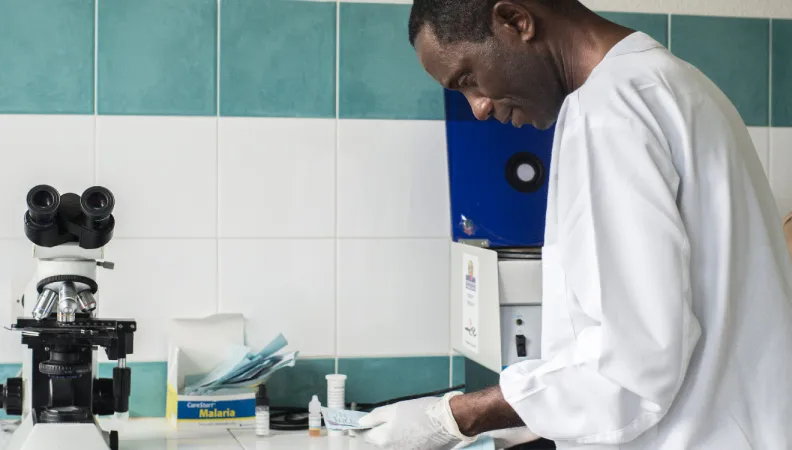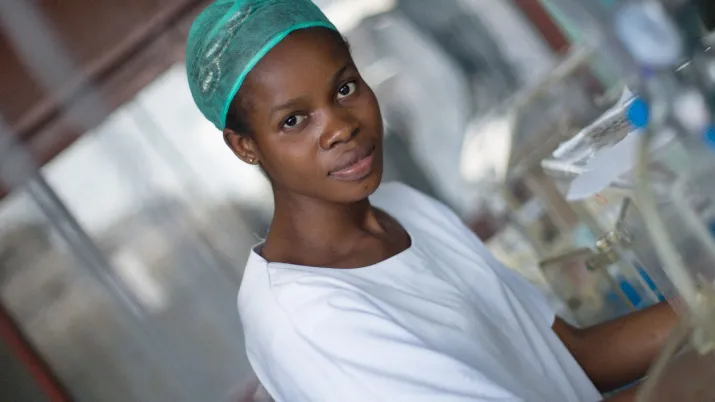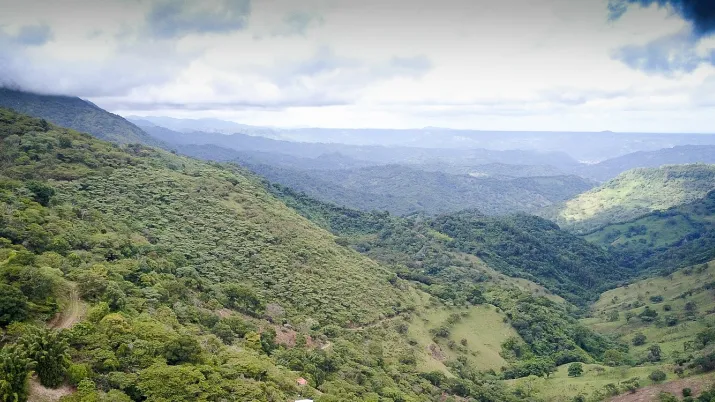Share the page
Covid-19 – Health in Common Initiative: Financing the First Projects in Africa
Published on

In keeping with the commitment made by French President Emmanuel Macron, AFD is taking action to respond to the global health crisis. As part of the "COVID-19 – Health in Common" initiative launched on April 9, AFD has announced that it will finance six new projects to help 16 African countries combat the pandemic.
Press release
As part of its commitment to the "COVID-19 – Health in Common" initiative, AFD has announced that it will provide financial support for six new projects worth a total of €12 million.
This support, which will initially focus on sub-Saharan Africa and countries in the Indian Ocean, responds to the urgent need for research, monitoring, testing, formulating effective health policies, and patient treatment. These different steps are vital for combating the spread of COVID-19 in Africa.
This health crisis exacerbates inequalities. In response, AFD will uphold its mandate by ensuring that the supported projects promote gender equality and help empower women.
With the approval of the health authorities of the 16 affected countries, a broad coalition of partners – already active in areas where AFD operates – is joining forces with civil society organizations and public institutions, including the French National Research Institute for Development (IRD), the Indian Ocean Commission, Institut Pasteur, Mérieux Foundation, Research, Studies and Documentation Center for Health Economics (CREDES) and the Alliance for International Medical Action (ALIMA).
These six projects are an additional response to this unprecedented health crisis affecting developing countries, following those already implemented with Inserm and Expertise France. Another 14 projects are expected to receive further support soon.
"As a stakeholder in driving unprecedented global solidarity to face the COVID-19 health crisis Africa, AFD is fully committed to a targeted response to the health issues created by this pandemic. In view of this emergency, AFD has mobilized all of its teams and resources to provide rapid, appropriate responses that are adapted to the needs expressed on the ground by our partners. AFD's primary objective is to reinforce the most vulnerable healthcare systems and support the players involved in this fight that affects everyone," says Rémy Rioux, AFD Chief Executive Officer.
Six Projects Financed by AFD
- Support project for pandemic action research and establishment of the African response to the COVID-19 pandemic – ARIACOV
➔ Countries involved: Benin, Cameroon, Ghana, Guinea, Democratic Republic of Congo and Senegal
➔ Grant amount: €2.2 million
➔ Recipient: French National Research Institute for Development (IRD)
The project's goal is to support national governments in developing and strengthening national response strategies for the COVID-19 pandemic in six western and central African countries by mobilizing action-research tools and resources.
It has three components:
- Implementing number of activities including training and the provision of equipment and supplies to perform large-scale diagnoses of the virus as well as sero-epidemic surveys;
- Modeling and conducting epidemiological surveys;
- Setting up or reinforcing data-collection mechanisms (media, social networks) possibly paired with qualitative/ethnographic surveys to better understand how people and health personnel perceive COVID-19, as well as assessing government response measures.
- Financing an epidemiological surveillance and alert network in the Indian Ocean
➔ Countries involved: Indian Ocean Commission member states: Madagascar, Mauritius, the Union of the Comoros, Seychelles. The French overseas departments Réunion and Mayotte will receive information, contributing to efforts to control the pandemic on these islands.
➔ Grant amount: €2 million (financing in addition to the support project for the epidemic surveillance and alert management network)
➔ Recipient: Indian Ocean Commission
The project will help improve the protection provided to people in the IOC member states by reinforcing regional health safety. The project's goals are to strengthen and sustain the implementation system of the SEGA One Health Network as well as consolidate and develop the network's activities.
It has four components:
- Reinforcing diagnostic and epidemic surveillance capacities (tests and laboratories)
- Preventing and controlling infections, and if needed treating the infected (providing equipment and medication)
- Developing their communication capacities
- Strengthening partnerships in particular with the Indian Ocean Regional Intervention Platform (PIROI) and the Institut Pasteur of Madagascar.
- Support for Institut Pasteur in Africa for rapid COVID-19 testing
➔ Countries Involved: Niger, Senegal, Guinea, the Central African Republic, Madagascar
➔ Grant amount: €2 million
➔ Recipient: Institut Pasteur in five affected countries
This project's goal is to provide emergency support to the five Pasteur institutes across West Africa. This support will help them ensure the national and regional COVID-19 laboratory mandate is fulfilled and to help the countries in their fight against the pandemic. With €2 million, the project should allow these five institutes to perform between 500 and 1,000 tests per day over six months.
It has four components:
- Strengthening and maintaining the institutes' front-line laboratories
- Supporting recipient institutes with the necessary reagents and supplies for performing molecular biology tests for COVID-19 diagnostics
- Reinforcing human resources in overburdened front-line laboratories for an optimal response to the COVID-19 pandemic
- Protecting scientific staff working in the front-line laboratories.
- Reinforcement of COVID-19 diagnostic capacities in seven countries – RESAOLAB Project
➔ Countries involved: Benin, Burkina Faso, Guinea, Mali, Niger, Senegal, Togo
➔ Grant amount: additional financing of €1.5 million (initial amount of €8 million awarded in July 2019)
➔ Recipient: Mérieux Foundation
The Mérieux Foundation sprang into action early by helping its partners access laboratory reagents so they could perform COVID-19 diagnostics. AFD has awarded an additional €1.5 million in financing to the "West African Network of Biomedical Analysis" (RESAOLAB+) to reinforce these diagnostic abilities and limit the virus' propagation.
It has three components:
- Providing laboratories in seven countries with equipment, consumables and reagents to perform diagnostics, patient monitoring, and to ensure the safety of medical personnel with Personal Protective Equipment (PPE)
- Creating a platform for sharing documentation (response plan, WHO guidelines, etc.) as well as health decision-making councils in the network's countries created by the RESAOLAB project. The focus is thus on reinforcing and standardizing the guidelines to be followed for the laboratory component and structuring the medium-term sector to respond to epidemics
- An ex post study of the role of the laboratories' national guidelines in response to the crisis. This enables the collection of different data and best practices concerning the laboratory's involvement and fundamental role in the pandemic, by capitalizing on the countries' experiences.
- Emergency support for hospitals in the Democratic Republic of Congo (DRC) for better patient treatment - PROMEKIN II
➔ Intervention countries: Democratic Republic of Congo
➔ Grant amount: €2 million (in addition to €15 million of financing awarded in December 2019)
➔ Recipient: Research, Studies and Documentation Center for Health Economics
The purpose of the PROMEKIN II project is to support several healthcare centers in the city of Kinshasa (the hospital referral center for Kingasani, the maternity healthcare center in Binza Météo, and the hospital referral center for Binza). The approved project will supplement this financing in order to support Monkolé referral hospital, the authorized COVID-19 center, as well as partner-hospital networks. It will also contribute to the implementation of a national COVID-19 response plan.
It has three components:
- Supporting hospital partners so they can be included in the action strategies of the national response plan.
- Assisting the Monkolé hospital in its role as the referral center for treating "COVID" patients.
- Assisting other establishments with best-practices implementation through the hospital platform's role of providing expertise, consulting, support and training.
- Reinforcement of African Health Ministries' capacity to respond to the COVID-19 pandemic
➔ Countries involved: Senegal, Burkina Faso, Cameroon, Central Africa Republic and the Democratic Republic of Congo
➔ Grant amount: €2 million
➔ Recipient: The Alliance for International Medical Action (ALIMA), an independent medical NGO.
The project seeks to reduce morbidity and mortality, stem the spread of COVID-19 and reinforce health ministries' capacity to respond to the pandemic.
It has three components:
- Providing quality, bio-secure treatment to confirmed or suspected COVID-19 cases in health establishments as identified in these five Francophone African countries
- Reinforcing measures to prevent infection prevent and control (IPC)
- Supporting measures that raise awareness and seek to stop or slow the spread of the virus.
Press contacts:
Further reading
France Launches, via AFD, The “Covid-19 – Health in Common” Initiative to Support African Countries
Published on April 9, 2020


